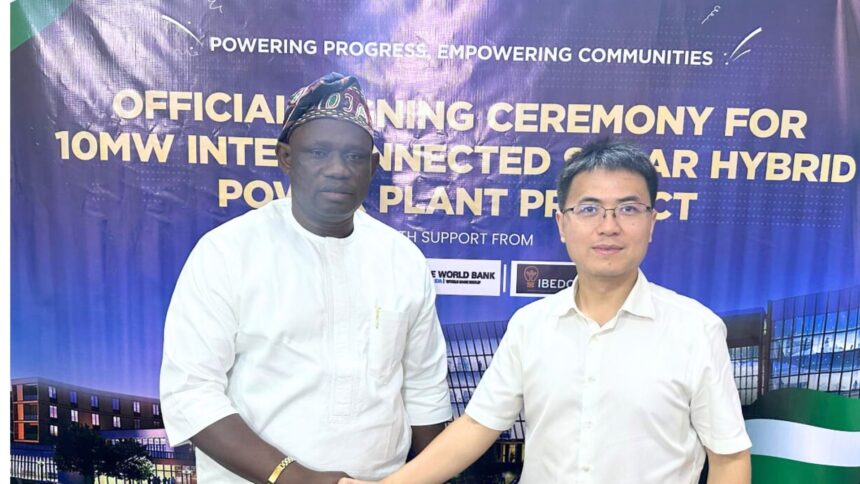…2MW first phase set for completion before Dec. 2025 with supply at ≤N200/kWh
Oredola Adeola
Saki, a community in the Oke-Ogun area of Oyo State with over 4,000 homes, is set to enjoy a minimum of 22 hours of electricity daily, following the official signing of a 10MW interconnected solar hybrid power project between De-Janees Concept Ltd and Hexing Electrical Company Limited.
The signing ceremony, held in Lagos on Friday, was witnessed by the top management teams of both firms, committed to providing sustainable electricity to communities that have long suffered from poor grid supply.
Engr. Isaiah Fatokun, Managing Director/Chief Executive Officer of De-Janees Concept Ltd, speaking at the ceremony, noted that the project aligns with the Renewed Hope (power) agenda of President Bola Ahmed Tinubu’s administration.
He confirmed that the De-Janees and partners have secured approvals from the Rural Electrification Agency (REA) and the Ibadan Electricity Distribution Company (IBEDC).

According to Fatokun, the partnership with Hexing will deliver a 2MW solar power solution through the Sango feeder, designed to power over 4,000 homes.
He emphasized that the project would stimulate economic growth, energize local businesses, revolutionize education, and improve the overall quality of life in Saki.
Fatokun stated that the partnership with Hexing is also focused on creating jobs, supporting long-term employment, and promoting environmental sustainability.
“Upon commissioning, the project will guarantee Saki residents access to Band A tariff benefits, with electricity costs not exceeding N200 per kWh and a minimum daily supply of 22 hours,” he said.
He also extended gratitude to His Royal Highness (Dr) Oba Khalid Olabisi (Ilugbemidepo III), the Okere of Saki land, for his support, as well as the REA, NERC, the Oyo State Government, Stanbic IBTC, and Unity Bank.
Recalling the project’s inception, Fatokun explained that De-Janees initially applied to REA last year for a mini-grid license.
“Along the line, the company transitioned into a Renewable Energy Service Company (RESCO) with the right technical partners, funding, and target communities,’ he said.
He said, “The REA, initially approved a project in Kano, but we rejected it based on technical and commercial viability after a study was conducted.
“We later got a fresh approval after conducting another feasibility study and got the scope of a viable electrification project in Saki, covering 15 communities with a combined population of over 500,000.
“Technical feasibility studies revealed over 100 filling stations, hotels with more than 100 rooms, schools, and police stations in the area, all are existing with inadequate or no power supply.
“Following this, we secured three land parcels for the project and obtained the necessary approvals from NERC and IBEDC.
“A Non-Disclosure Agreement (NDA) and a Memorandum of Understanding (MoU) was later signed with IBEDC, allowing the use of the existing distribution transformer (DT) network, including lines and transformers.
“IBEDC granted us the approval to generate, distribute, and recover revenue from the project over 15 years.
“Based on current estimates, the existing distribution infrastructure in Saki has a capacity of 9–10MW—enough to supply the entire town with 24-hour power,” the GM stated.
Fatokun, therefore, assured that if energy demand increases after project commissioning, the capacity can be scaled up accordingly.
He said, “The project with an implementation timeline of 10 to 18 months is expected to break even within five to seven years.
“De-Janees will generate and inject power directly into the existing grid while undertaking network upgrades—including replacement of poles, transformers, and cables in select communities.
“We expect to break even in less than six months due to minimal commercial and technical losses,” Engr. Fatokun noted.
Engr. Boluwaji Ayeni, Power Plants Project Manager, De-Janees, on his part, stated that the project partners have signed a Non-Disclosure Agreement (NDA) with the Ibadan Electricity Distribution Company (IBEDC), laying the groundwork for upgrading the existing distribution infrastructure.
He pointed out that most of the infrastructure in the distribution and transmission sector is over 40 years old, making modernization a critical component of the project.
“In our assessment, deploying solar infrastructure is faster and more feasible than conventional power generation methods.
“Unlike gas turbines, which could take up to four years to install and operationalize, solar infrastructure can be delivered within six to twelve months,” Engr. Ayeni explained.
He further added that during a recent two-week stay in Saki, there was no power supply, underscoring the urgency of the project.
“We are committed to meeting the energy needs of the community, and with the current pace, we are confident that Phase One will be commissioned by December this year,” he added.
Simon Ye, Vice President of Hexing Group, reaffirmed the company’s commitment to delivering sustainable and green energy solutions across Nigeria.
He revealed that the Saki electrification project is Hexing’s first major undertaking in the country.
“We’ve completed the preliminary stages and have moved into the engineering phase. This project goes beyond business for us—it’s about bringing life and development to a community,” Ye said.
He noted that construction and civil works will run concurrently with the delivery of equipment to Nigeria.
Within five months, most of the materials will have arrived, and installation of the solar panels and battery systems will follow for about three months.
“In total, the project is expected to be completed and commissioned within ten months,” he stated.
Engr. Saheed Aminu, Head Project Manager, De-Janees Concept Ltd, in a presenting highlighting the scope of the project, revealed that the project will be executed in three phases.
He noted that the first phase, which involves the deployment of a 2MW solar solution, is set to commence immediately and is expected to be completed before December 2025.
He noted that De-Janees Concept Ltd, is the primary executor of the project, working in partnership with Hexing Group, the Rural Electrification Agency (REA) and the World Bank Group to bring the full 10MW solar power plant to life.
“The initial phase is designed to power over 400 homes, as well as critical public institutions, including schools, hospitals, and small businesses within the Saki community,” he said.
Engr. Aminu, on his part stated that the long-term vision is to scale the project to 10MW and eventually to 30MW, to extend power supply to other underserved and unconnected communities across the region.

“This marks a significant step forward for sustainable development in Saki and in Nigeria at large,” he said.
Engr. Dotun, in his remarks, commended the extensive planning that has gone into the project so far.
While acknowledging that more work lies ahead, he expressed confidence in the team’s capacity to deliver.
“With the agreement now signed, we’re moving straight to the site to begin implementation. The goal is to ensure that Saki is powered as soon as possible,” he said.




